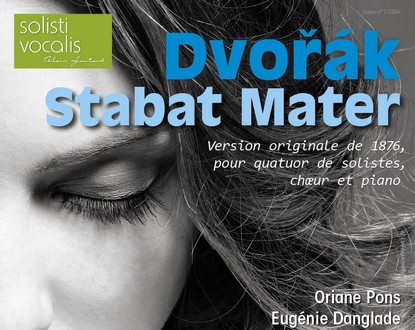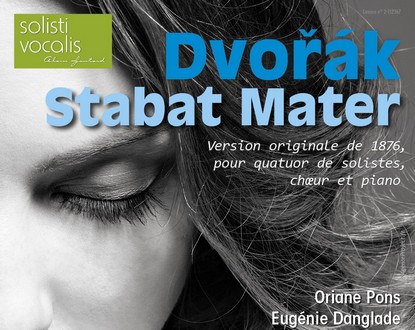Whether or not you are familiar with the orchestral version of Dvořák’s Stabat Mater, Solisti Vocalis and the vocal ensemble Tutti Vocalis offer you the opportunity to discover a poignant and modest work in a version rarely performed in concert. This will take place on Saturday, April 14, 2012, at 8:30 PM at the Port of Nice church.

Oriane Pons Lyric Soprano
Eugénie Danglade Mezzo-soprano
Patrick Garayt Tenor
Bernard Imbert Bass
Régine Capelle Pianist
Direction: Alain Joutard
September 19, 1875: After a short life of two days, Josefa, the daughter of Antonín Dvořák, dies.
A few months later, still crushed by grief, Antonín Dvořák begins composing a Stabat Mater, his first work based on a religious text, as if to channel his sorrow and to focus his mind on a task.
Through the voice of the Virgin Mary, the ideal and unattainable mother mourning her son at the foot of the cross, he gives a voice to his wife, and then to himself, without seeking consolation. He completes the composition of this dense and poignant work, a first version marked by its great precision of writing, without it ever being performed.
A year later, Antonín Dvořák lost Ruzena and Otokar, two more of his children.
He then resumes working on the Stabat Mater, which was already complete but set aside the previous year. He composes three new movements, sometimes strongly modifies the existing movements, and adds an orchestration.
December 23, 1880: This new orchestral version is premiered in Prague and immediately marks the beginning of a series of great international successes.
2004: After years of being forgotten, the score of the original version from 1876 is found in a private collection and published.
April 14, 2012: Solisti Vocalis offers you the chance to discover a work in its original, stripped-down version.
This version accompanied by piano alone and with a reduced ensemble allows us to hear the inexpressible drama of the loss of a child in its most direct and intimate expressivity and emotion.
The concert program is completed by the Slovak Folk Songs by Béla Bartók.



